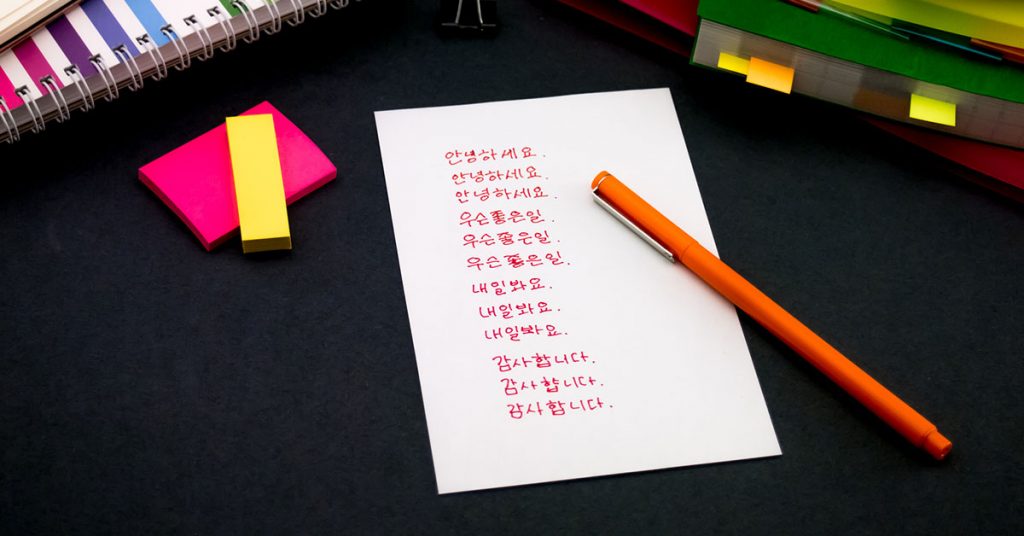Are you interested in learning a foreign language, but aren’t sure that traditional methods will give you the results you want? A lot of people decide to learn through curriculums and classes, only to realize much later that the most effective learning happens outside the classroom. The theory of a language is definitely important, but you have to get some practical experience as well. If you want to fast-track your language learning, this article sets out 20 tips to speed you along.
Since this is a longer article, I’ve posted the contents here. That way, you can jump to the section that you’re looking for. There’s a shorter article outlining the top 10 tips for learning a language if you’re short on time. Both have some great tips on learning a foreign language.
1. Talk as Much as You Possibly Can
3. Don’t Make Language Classes Your Main Learning Strategy
4. Use Online Media Like Newspapers, Movies, and Radio Shows
5. Get Used to the Idea of Making Embarrassing Mistakes
6. The First 100 Words You Learn Should Be Ones You Can Start Using Right Away
7. Use a Translation App or Pocket Dictionary Wherever You Go
8. Practice Mentally as Much as You Can
9. Learn the Pronunciation Patterns of the Language
10. Learn Vocabulary From Online or Audio Courses
11. As Soon As You’ve Learned 100 Words, Start Working Towards Having Conversations
12. Study Until Your Brains Turn Into Mashed Potatoes
13. Learn The Single Most Useful Sentence
15. Find A Practice Partner Who Speaks Your Target Language
16. Strategize The Way You Use New Words
17. Don’t Be Shy About Asking For Help
18. Be Prepared To Be Misunderstood
19. Get To Where You Can Blend Into A Group
As you’ll see, there are plenty of tricks out there that’ll help you. We’ve compiled a list of things you can do to speed up your learning. These all from real people who’ve used these strategies to help them learn to speak a second language fluently. You can try out as many or as few as you want. The more ways you find to practice, the better results you’ll see!
1. Talk as Much as You Possibly Can

Once you’ve learned a few dozen words and some basic grammar rules, you’re ready to start talking. You’ve already taken the first step toward learning a foreign language. There may not be a trick that magically gives you fluency in a second language. However this is the closest thing to it. During your conversations, try to make correct any mistakes you make. Keep a pocket dictionary or translation app on hand. With this practice strategy, you’ll be able to advance much faster than if you’d just stuck with classes or solo coursework.
At the beginning, you won’t need a speaking partner who’s a native speaker, or even someone who’s fluent. The main thing is that they’re better than you, and can give you feedback and corrections. This can seem like a big step to take, but so is deciding to learn a new language! Think of it this way: you can take the leap and find people to talk with, or spend five times as long with rote memorizations. All that practicing with flashcards, and doing writing exercises about Aunt Gertrude’s bean soup. A textbook or computer is easy to ignore, but if you have a commitment with another person, you’ll be far more likely to get regular practice in.
It’s an established fact that if you’re learning new information, it’s much easier to remember what you learn if it takes place in an engaging environment. You can realistically learn words after using them just three or four times in a conversation. This beats having to see them 20 times or more in basic study materials before you really have them down. The more associations you can develop with your vocabulary, the easier it’ll be to remember words down the line. Conversations are the perfect way to do that.
2. Quality Over Quantity
Chances are, you know plenty of people who’ve spent years in school studying a second language. Today none of them can remember anything more than how to ask for the bathroom. This is mostly because it’s really hard to take in something that complex over short periods of time that are spread out over the week.
If you really want to make solid progress, try setting aside just a couple of weeks where you practice three or four hours every day. If you’re trying to learn a language while working remotely, scheduling is particularly important. You won’t be able to schedule several hours at a time, but you should be able to carve out a few minutes here and there for efficient learning. You’ll reach your goals so much faster than if you spent just one hour per day, spread out over several months.
You should also be ready to work hard during those periods. There’s no point designating ‘language learning time’ and then spending it scrolling through social media. You have to be 100% ready to focus on your language, with no distractions. Sometimes I work so hard on my language learning that I actually come out of it with a headache! That’s the kind of dedication that you need to demonstrate if you want to make progress.
3. Don’t Make Language Classes Your Main Learning Strategy

With so many cheaper and more effective options out there, language classes are pretty much just a waste of time, not to mention money. There are better ways to learn a foreign language. Classes can be one of the most expensive options, as well as one of the least effective. Since classes are expected to advance as a whole, the entire class will only move as fast as the slowest learner. Imagine that just a few people have trouble understanding the subjunctive tense in Spanish, but everyone else has mastered it. The teacher will have to keep going over it until everyone has a decent grasp on it. For these reasons, lots of people decide to learn a language remotely.
Language learning should be a very personalized process. Each person has different strengths and weaknesses, and a classroom setting can’t really accommodate that. As you learn more and more, you’ll discover that some things come naturally, but others take a while to click. In a group setting, it doesn’t really make a difference whether or not you’re good at something, since you’ll just be progressing at the same rate as everyone else. It’s much better to choose a study option that lets you go at your own pace, not someone else’s.
It’s particularly important to find your own way of working in the current global circumstances. This article was originally published in the middle of the global COVID-19 pandemic, when a large proportion of the world’s population was told to stay home under lockdown. Some people decided to make the most of the COVID-19 pandemic and learn a new language. That’s great, but for that endeavor to succeed, you have to be following a learning plan that suits you.
4. Use Online Media Like Newspapers, Movies, and Radio Shows

Online learning is another one that has changed the language-learning landscape. When I was a schoolboy growing up in the UK and struggling with my French and German lessons, it was almost impossible to find authentic language materials to assist in my studies. Perhaps I might be able to get the occasional newspaper or magazine, but that’s all. Today, there is a whole world of possibilities available just a mouse-click away. Learning a foreign language is certainly easier than it used to be.
One of my favourite options is YouTube. YouTube is a great way to immerse yourself in a foreign language. In addition to targeted course, there’s all sorts of real-life material available. You can find language lessons to suit all levels, and for the advanced learner, you can access foreign language television directly. This is a great way to perfect your listening skills in particular. Of course, it’s also a fun way to learn your new language!
In addition to speaking in-person and online, you can immerse yourself even more in your target language. Even if you’re strapped for time, it’s still easy to work a few things in. Listen to a foreign radio station that streams online on your way to work. Read a couple of newspaper articles from another country instead of reading local news. Just remember, this isn’t a replacement for speaking practice – it’s mainly just a helpful push in the right direction.
5. Get Used to the Idea of Making Embarrassing Mistakes
You’ll make mistakes no matter how hard you study, so it’s best to just accept it and keep going. Make a habit of writing down whatever you mess up, so you can work on it and avoid making the same mistake next time. If you make this a habit, you’ll be using your slip-ups to learn about areas that need more work. Overall you’ll be able to progress even faster. Focus on what you get right, rather than what you get wrong, and don’t let it discourage you from putting yourself out there.
Once you’ve corrected all the mistakes, keep reviewing the words and phrases that you got right. They will become second nature. Over time, you’ll get more and more used to using words in context. You won’t even have to give it a second thought. This is particularly true with verbs. Initially, you’ll find yourself searching for the right verb conjugation, particularly for those tricky one such as the conditional tense. However, the more you use certain verbs in certain situations, the more it becomes an instinctive choice. Before you know it, you’re speaking like a native!
6. The First 100 Words You Learn Should Be Ones You Can Start Using Right Away

Make the language work for you when you’re learning a foreign language. Most language-learning programs, like Rosetta Stone, teach you vocabulary that revolves around family, household items, city names, and so on. In most contexts, especially in the case of international travel, that won’t help much. You could be sailing through a beginner’s course with high scores all the way, and still not be able to ask for directions in an unfamiliar city. Sure, most of those words will be useful eventually. But that won’t help if you’ve already lost motivation by that point, and completely abandoned your language learning!
A teaching program will cover the basics, but it won’t necessarily help you with your specific needs. The good news is, it’s not that hard to take control of the words you learn. Make a list for yourself of 100 words that you’ll use in everyday situations. There no hard and fast rule to define how many words you need to know to be fluent in a language, but those first one hundred are very important. Learn a few basic grammar rules, and start putting together sentences. Pretty soon, you’ll be getting around in quite a few situations without having to use a translator or phrase book.
Remind yourself of those 100 words as you go about your day. When you’re getting in your car to drive to the shops, run through in your head how you’d tell someone that in your target language. If you run into a friend at the shops, think about how you’d greet them in your foreign language. What would you say if you wanted to go and grab a coffee with them? I find that this kind of practice really brings your language learning alive.
7. Use a Translation App or Pocket Dictionary Wherever You Go
When those 100 words that you’re using each day do not suffice, you can reach for a translation app. You might be surprised at the difference this can make. If you need to say something but haven’t learned the right vocabulary yet, you’ve got the perfect resource right there with you. Translation apps are particularly handy for this type of thing; just whip your phone out, do a quick search, and in a few seconds you’re back to talking.
Given that conversation will be your best learning tool, using this strategy is a great way to optimize your learning when you’re talking in a foreign language. If you have a way to look up words on the go, you can take advantage of every opportunity to pick up new vocabulary; plus, the words you learn with this method will be even easier to remember next time you need to use them.
8. Practice Mentally as Much as You Can
Once you have really started to feel comfortable with the words that you’ve been learning, you’re ready to take the next step towards your goal of learning a foreign language. Try to formulate your thoughts using the foreign language, no matter what the situation. Make up conversations that you could see yourself having in the future, such as questions and answers about your job and background, or your travel plans.
Everyone naturally thinks in their own native language; as soon as you start learning, you can begin substituting with the foreign language, even if it’s just mentally identifying object names. Challenge yourself to translate your thoughts, and look up words you need to complete sentences. Visualize social interactions, and think about what you and your friends would be likely to say. When the time comes to have these types of conversations in real life, the words will come naturally. You’ll be able to focus more on enjoying yourself, and less on searching for the right words.
9. Learn the Pronunciation Patterns of the Language
This is one way to find the method in the madness, and if the language you’re learning is Latin-based, you’re in luck! There’ll be all kinds of parallels to English that will help you make sense of everything. For instance, words in English that end in “-ally” and “-tion” will probably have equivalents in the other language. “Technically” and “accidentally” in English become “technicalmente” and “accidentamente” in Spanish – so you can see that the Spanish equivalent to the English “-ally” ending is “-mente”. Learning patterns like this can help you expand your vocabulary. If you already learned the Spanish word for “accident”, and you also knew how to use the “-mente” ending, now you know how to say “accidentally” as well.
10. Learn Vocabulary From Online or Audio Courses

There’s no doubt that learning through conversation is the best way to advance, but what if you don’t know a single word in the foreign language? The best way to start out is through a basic online language course. You can start by learning fundamental grammar and vocabulary, and then be able to move on to forming sentences on your own. After just a week or two of taking a course, you’ll have the tools you need to start having real-life interactions, with simple phrases like “how do I say this” and “I am looking for this”. Most introductory courses teach you words like you, I, the, it, here, there, like, thank you, and so on. A great way to start when you’re learning a foreign language.
It’s important to move on from this method though; just learn about 100 words, and then start using them in everyday life. Most online courses will just have you learning through “repeat after me”, and won’t give you a working knowledge of the words you’re learning. The best solution is probably a mix of the two options. Keep going with the online language course for a large part of your learning, but back this up whenever you can with the real-life practice.
11. As Soon As You’ve Learned 100 Words, Start Working Towards Having Conversations
You may have noticed that there’s a lot of emphasis on the idea of learning 100 words in this article. According to studies, half of spoken communication is made up of just 100 words. If you can learn the most commonly used 100 vocabulary words of another language, plus the grammar rules you need to put them together, you’re well on your way to having real conversations! In most languages, you could realistically learn only about 800 words and hardly ever have to pause a conversation to look something up.
After just a few days of study, you should be able to say a whole host of basic sentences.
Solidify your small vocabulary by forming sentences, whether you’re writing it down, doing it mentally, or talking to people. Don’t try to learn as many words as possible right away; you won’t use most of them in the beginning, and the ones that don’t get used will just be forgotten. Instead concentrate on grammar and the idioms of the country – you know you’re getting good when you can start making jokes in another language!
12. Study Until Your Brains Turn Into Mashed Potatoes

Learning a foreign language requires a lot of intellectual effort. Think of it this way: when a guy is serious about bodybuilding, he’ll work out until his muscles feel like jelly to get the best possible results. If you really want to see progress with your language studies, use the same strategy on your brain. If your eyes aren’t crossed yet, work on it some more! This kind of intensive learning enables you to make connections that more spread-out activities would never give you. The better you get at speaking, the longer it’ll take for your brain to reach its limits.
Of course, just like the body of the bodybuilder, your brain adapts to the exercise over time. You will find that it is excruciatingly difficult to produce sentences when you first start speaking your new language. It will also be incredibly time-consuming. In fact, you’ll probably wonder if you are ever going to be able to speak your new language in any kind of functional way. Every sentence just takes so long to form! However, as with the very conjugations mentioned earlier, you will slowly start to find that things get easier.
You’ll slowly start to find that you can form your sentences more quickly, and with much less effort. You start to feel much more at home with your new language. This is when you really start to make progress, and feel like you are starting to speed up. There are also some simple rules that you can follow to speed up your language-learning. If you can keep this up for a few months, you’ll find that you’re soon on the road to fluency.
13. Learn The Single Most Useful Sentence
“How do I say this?” will save your life – once you know how to say this phrase, it’ll unlock all kinds of mysteries. Don’t be shy, ask whenever and whoever you need to. It’s the key to learning a foreign language.
14. Hire A Personal Tutor
This can be pricey for certain languages or countries, but it’s one of the best investments you can make when you’re learning a language. If you’ve got the money, spending time with a tutor is a great way to develop your speaking skills. There’s no rush to get sentences out, and very little pressure to make yourself understood. It’s really helpful if you have a professional to not only correct your mistakes, but also help you understand the theory behind the correction. If you spend plenty of time with a good tutor, you can be conversational in just a matter of weeks.
15. Find A Practice Partner Who Speaks Your Target Language
This could be someone you find online, or someone you’re dating. If you’re spending a lot of quality time with someone who doesn’t speak English, you’ll basically be forced to learn theirs. With luck, you could achieve fluency in four or five weeks!
If you decide to look online for a language partner, you can probably find someone who’ll trade their time helping you out, for your time helping them with English. This is a great (and free!) way to get in some practice, and you may even make a couple of friends along the way.
16. Strategize The Way You Use New Words
As you spend time talking in a foreign language, you’ll be looking up words and using them for the first time on the go. Research shows that if you use new vocabulary three or four times shortly after learning them, you’re much more likely to remember them long-term. Ideally, you would use a word you just learned a couple times right away. Perhaps later that same day as well. Once you have a selection of words at your disposal, you should search out situations that will allow you to use them. If you keep practicing the words over the following days, they will rapidly become indelibly embedded in your memory.
17. Don’t Be Shy About Asking For Help
It’s very rare for someone to get irritated by a foreigner asking about the right way to say something. Most of the time people are glad to answer a quick question; you may even get more help than you asked for! This is where “how do I say this?” comes into play. There’s no need to feel embarrassed about asking this, and in fact the people you’re asking will probably be impressed that you’re trying to learn a foreign language.
18. Be Prepared To Be Misunderstood
Every language has its share of nuance, and direct translation isn’t always possible. As you get more advanced, you’ll end up in conversations about complex or emotional subjects. Things can get fairly intense. Sometimes what you meant to say won’t be what the other person hears, simply due to the fact that you haven’t learned all the subtleties of the language yet. You could end up having to use twice the amount of words you should have needed, just to make sure you’ll be understood. It can take years to master all of the slang terms and idioms that native speakers already know, so don’t get discouraged when something like this happens – it’s all part of the process.
19. Get To Where You Can Blend Into A Group

When you first start out, everything will seem unfamiliar. You’ll learn a few words, but you can hardly even understand them when they’re said back to you. Pretty soon though, your comprehension will outrun your speaking ability. You’ll find that you can understand three times as much as you can say, and the main job will be to talk as well as you can listen. Then you hit the first real sweet spot of language learning, when the words you need just come to mind and you aren’t constantly having to translate from English. At this point, you can have a conversation about pretty much anything without having to pause or make guesses.
The level beyond that is when you can hold your own in a group setting. Social interactions can get hectic, and if you can not only keep track of what’s happening, but join in the mayhem, that’s when you know you’ve made it. It’s the toughest test when you’re learning a foreign language. There’ll still be plenty to learn in terms of local idioms, sayings, etc., but at that level of proficiency in the language, these are just the finishing touches.
20. Have Fun!
It’s hard to learn anything well if it isn’t somehow engaging. Learn new vocabulary related to your favorite hobbies, or talk with a language partner about a country you want to visit someday. There are so many interesting ways to study a language, and it’s just a waste of time if you’re trying to learn from traditional, impersonalized courses. The words and theories alone aren’t enough to engage your brain; any person who’s sat through language classes can testify that they can barely remember their assignments from last week, let alone what they learned a year ago. It’s impossible to say exactly how long it takes to learn a language, but one thing is for certain – it’s much faster if you’re having fun! You can progress much more quickly when you learn alongside real people – enriching not only your intellect, but your life as a whole.










